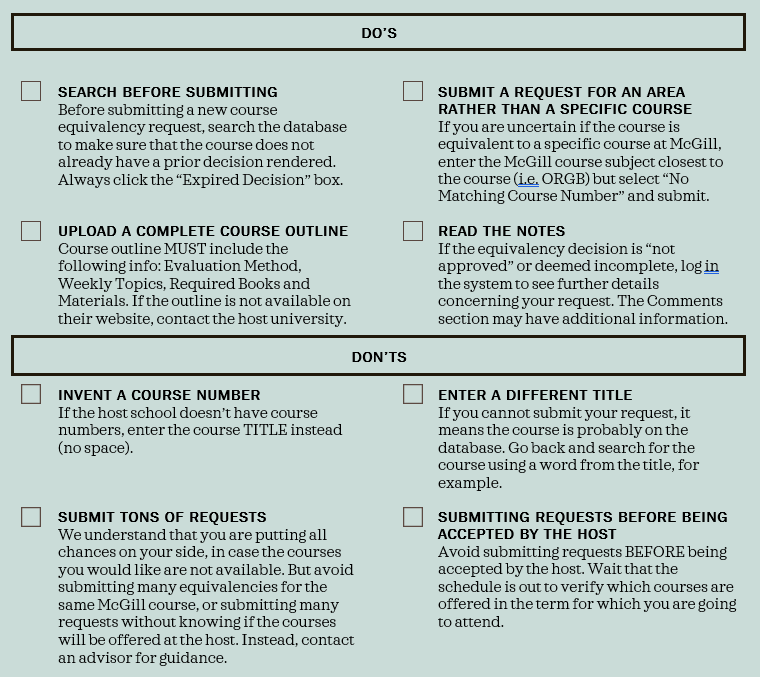Review the steps below to find out how to transfer credit towards your BCom degree for courses completed during an approved exchange or independent study away. Review the Course Approval Slides for additional help and details.
- Step 1: Verify Course et Grade Requirements
- Step 2: Verify BCom Program Requirements
- Step 3: Assess your courses for equivalency
- Step 4: Verify credit system of the host institution
- Step 5: Report your courses on the Minerva Transfer Credit Assessment Form
- Step 6: Transcript and Graduation
Step 1: Verify Course and Grade Requirements
In order for a course to be considered for transfer, it must meet the following conditions:
- Course must count for credit toward a degree at the host institution. Courses taken toward a certificate/diploma or courses taken through continuing studies will typically NOT be credited unless they count toward an undergraduate degree at that institution.
- Course must have a syllabus that includes, at a minimum, contact hours, course objectives, readings, and method of evaluation.
NOTE: Students must verify that they have the required prerequisite for any course they intend to take at the host university. Students should not take a course at the host university if they do not have the required academic background to succeed in the course.
- Course must not overlap in content with a course for which credit has already been granted.
- ALL components of the method of evaluation of each course must be completed by the end of the term of study at the host university.
- Course must generate a final grade that can be recorded on the host university’s official transcript.
Grade required to receive transfer credit:
- The grade earned in the host university course(s) must be equal to or higher than the grade/CGPA required to graduate from the host university. Normally, this is equivalent to a grade of C or better according to the host university’s grading scheme. The policy applies to both elective and required courses.
- Courses for which you register abroad cannot be taken with the pass/fail option. No credits will be granted for courses with no grades.
- You will receive a grade from the host school which will transfer as credits on your McGill transcript, however, grades will not be calculated into your McGill GPA.
Courses that are NOT accepted for transfer credit toward your degree are:
- Continuing education courses applied only toward certificates and/or diploma programs at the host institution.
- Courses applied only toward certificates and/or diploma programs at the host institution.
- Language courses offered by Language Centers or Institutes not associated with a degree granting institution.
- Practicum ("How to") courses: e.g., dance, fashion designing, orientation, photography, sports, web designing, wine tasting, etc.
- Skills-improvement courses such as “art workshop”, “Welcome Program”, etc.
- Volunteer programs.
Step 2: Verify BCom Program Requirements
- You are permitted a maximum of 6 credits of topics courses to count towards the complementary section of any specialization. The maximum total includes courses taken at McGill and other institutions.
- Students intending to pursue the CPA program should be aware that accounting courses approved by the BCom office and taken away may not meet the requirements for the CPA program. It is your responsibility to verify course requirements with the specific order where you plan to complete your CPA.
- A minimum of two-thirds of all program requirements must normally be completed at McGill. Therefore, a maximum of one-third of all program requirements may be completed at another university. You are permitted the following maximum of number of credits from another institution:
| Program |
Required credits |
Transfer credits allowed |
| Core |
36 |
9 |
| Major |
30 |
12 |
| Concentration |
15 |
6 |
| Minor |
normally 18 |
6 |
| Electives | varies | no limit |
Step 3: Assess your courses for equivalency
All courses taken outside of McGill, including electives, must be actively equivalent in the McGill Course Equivalency System.
Search the database to determine if the course you want to take has already been approved. Note that an equivalency on the McGill Course Equivalency Database does NOT guarantee that you will receive transfer credit for this course. You need to ensure that the credit value for this course is sufficient, that you achieve a satisfactory grade and that you have been approved for a study away or an exchange.
McGill Course Equivalency System
- When searching for a course equivalency, always include expired decision.
- If a course is not on the Course Equivalency Database, submit a new request.*
- If it is expired, submit a re-assessment.*
Please ensure course outlines to be reviewed contain the following detailed information: thorough description, breakdown of topics covered, method of evaluation and course materials, and credit weight and/or hours.

*Note that the course outline is reviewed by a Desautels professor. When receiving the email with the decision of the review, pay attention to the McGill Course Number as it may be different from what you submitted. Log in to the Course Equivalency System to see the details of the decision. The Comments section may have additional information.
Step 4: Verify credit system of the host institution
Familiarize yourself with the credit system of the host institution. Depending on your host institution’s credit weight, in order to obtain 15 McGill transfer credits, you may be required to register for as less as 3 courses to as much as 10 courses. When in doubt, inquire with the host about their credit weight in ECTS.
Consult with a BCom advisor before your registration starts at the host institution, in order to receive the right amount of credits that you need.
|
Host credit system |
Credit weight for one course |
Equivalent to 15 credits at McGill |
| Hours (to be used as a reference for Asia) |
36-39 Lecture hours = 3 McGill credits | 180-195 Lecture hours = 15 McGill credits |
|
ECTS (European Credit Transfer System) |
Anywhere from 2, 5, or 6 ECTS |
30 ECTS (24 ECTS = 12 McGill credits) |
|
UK credit points |
15 credits (7.5 ECTS) |
60 credit points |
| CATS (Credit Accumulation and Transfer Scheme) | 10 or 20 CATS | 60 CATS |
| Modular Credits (MC) | 4MCs = 39 Lecture hours = 3 McGill credits | 20 MC |
|
Australia & New Zealand |
varies |
24 points (4 courses) |
|
Japan |
2 to 5 credits |
16-18 credits |
Step 5: Report your courses on the Minerva Transfer Credit Assessment Form
The Minerva Transfer Credit Assessment Form attached to your Faculty Approved McGill Exchange application must also be completed in order to be eligible to receive transfer credit. Once your courses have been assessed on the McGill’s Course Equivalency System, and you have registered at the host, access Minerva to begin the process of adding the course(s) you are taking at the host university. Notify the bcom.mgmt [at] mcgill.ca (subject: Transfer%20Credit%20Assessment%20Form%20submitted) (BCom Office by email) at bcom.mgmt [at] mcgill.ca that a form has been completed.Step 6. Transcript and Graduation
The preferred method is for the host university to directly email the Official Transcript to officialschooldocs [at] mcgill.ca
A Registrar's Hold may be placed on your record if your final official transcript is not received by the deadline you have been given. This hold will prevent you from making changes to your student record or ordering official transcripts on Minerva. Furthermore, you may be charged a fee for any changes that need to be made to your student record after government reporting deadlines have passed.
Students who are taking one or more courses at another university during their term of graduation MAY delay their graduation by one term. Please consult with a BCom advisor.


